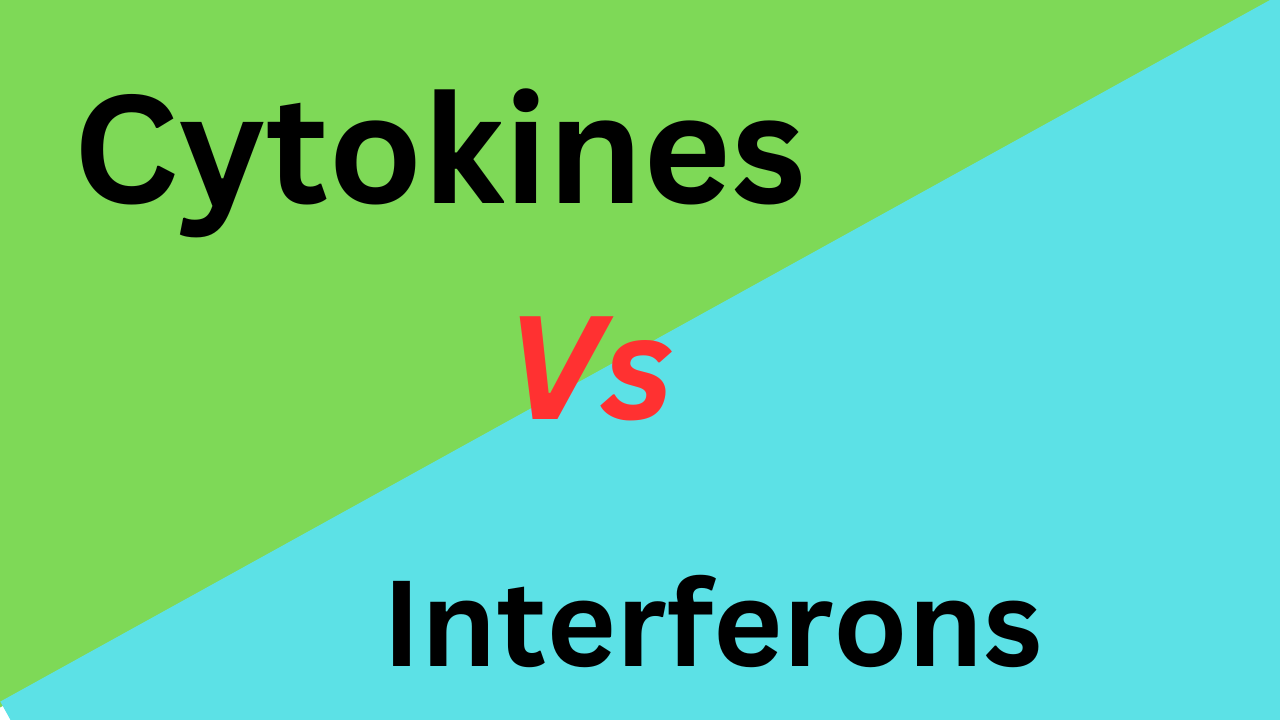What is the main difference between cytokines and interferons? The former are small proteins for controlling the growth and activity of blood cells in the immune system, while the latter are signaling proteins released from the host cells due to viruses or cancer cells.
An immune system is a complex network in higher animals. It consists of proteins, cells, and organs that defend the body against infections. The immune system consist of innate immune system and adaptive immune system.
Cytokines are released from the innate immune system in regulation of immune response. The interferons perform antiviral activity and alert the cellular immune system to viral infection. We wrote this article to help you differentiate cytokines from interferons.

Difference Between Cytokines and Interferons With Table
| Basic Terms | Cytokines | Interferons |
| Meaning | Small proteins that are important in cell signaling and controlling the growth and activity of blood cells and other cells in the immune system. | These are signaling proteins that are made and released by host cells in the presence of viruses and cancer cells. |
| Action Mechanism | Autocrine, paracrine, or endocrine. | Either autocrine or paracrine |
| Main Function | Produced by the immune system cells to communicate with other cells | Can affect viral infections |
| Significance | Regulation of chemically induced tissue damage repair and progression through phagocytosis and inflammation. | Promotes production of natural killer cell functions, antigen presentation, and inhibit the spread of viral infection. |
| Produced by | Macrophages, lymphocytes, endothelial cells, stromal cells, and fibroblast. | Viral infected cells, T-cells, natural killer cells, and macrophages. |
| Types | Chemokines, interferons, interleukins, lymphokines, tumour necrosis factor, and growth factors. | Type 1 interferon, type 2 interferon, and type 3 interferon. |
| Role In Adaptive Immunity | Develop immune responses and active effector cells that serve to eliminate microbes and other antigens. | Protect other cells against infections by inducing antiviral proteins. |
What Is Cytokines?
Cytokines are small proteins that play a crucial role in cell signaling and communication within the immune system and other biological processes.
These molecular messengers facilitate interactions between immune cells, helping regulate inflammation, immune responses, and various physiological functions.
Cytokines can promote or inhibit immune reactions, influencing the body’s defense against infections, tissue repair, and maintaining overall health.
Dysregulation of cytokines has been implicated in autoimmune disorders, inflammatory diseases, and even some cancers.
By coordinating cellular activities, cytokines contribute to the finely tuned orchestration of the immune system and its broader impact on systemic balance.
What Is Interferons?
Interferons are a group of signaling proteins that play a pivotal role in the body’s immune response against viral infections. These proteins are released by infected cells to alert neighboring cells about the presence of viruses.
Interferons activate a cascade of antiviral defenses, prompting neighboring cells to heighten their resistance against viral replication. They also bolster the immune system’s ability to recognize and destroy infected cells.
Interferons exhibit immunomodulatory effects, influencing the behavior of immune cells. Interferon therapies have been developed to treat certain viral infections and autoimmune disorders, harnessing their potent immune-regulating properties.
Subscribe To My Channel
Main Difference Between Cytokines and Interferons
- Cytokines regulate various immune and cellular processes beyond antiviral responses while Interferons induce antiviral defenses against viral infections.
- Cytokines include a diverse group of immune-modulating proteins while Interferon form a subset of cytokines with a specialized antiviral role.
- Cytokines released by multiple cell types in response to various stimuli while interferon released by virus-infected cells to alert neighboring cells.
- Cytokines influence inflammation, tissue repair, and immune coordination while Interferon inhibit viral replication, boost immune surveillance, and enhance recognition of infected cells.
- Cytokines used in cancer immunotherapy, autoimmune disease treatment, and immune modulation while interferon used in antiviral therapy, managing hepatitis C, and certain cancers due to their antiviral properties.
Similarities Between Cytokines and Interferons
- Both are protein-based signaling molecules that facilitate cell communication.
- Both regulate immune responses and combat viral infections.
- Both trigger diverse cellular responses, including inflammation and differentiation.
- Both exhibit varied effects on cells beyond their main functions.
- They can intersect in immune signaling pathways.
- Both can either promote or suppress inflammation.
- Both are explored for therapeutic applications in immune-related disorders.
Final Thoughts from Experts
Cytokines and interferons are both essential components of the immune system with their distinctions highlighting their specialized roles. Cytokines encompass a diverse array of immune-modulating proteins.
Interferons is a subset of cytokines with a laser focus on combating viral intruders and bolstering antiviral defenses. interferons specifically spotlight the immune system’s vigilant response against viral infections.
People Who Read This Also Read:
- Difference Between T Cells and B Cells.
- Difference Between Podocytes and Mesangial Cells.
- Difference Between Interleukins and Interferons.